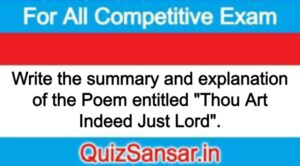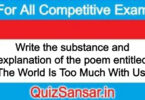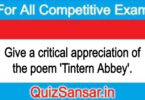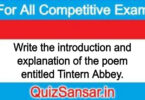
Write the summary and explanation of the Poem entitled “Thou Art Indeed Just Lord”.
Write the summary and explanation of the Poem entitled “Thou Art Indeed Just Lord”.
Ans.
Summary of the Poem
O Lord, you are just and fair and sol hope, you will not take it ill if I argue with you especially about something that is just and proper. I want to know from you why sinners prosper in the world and why, my every endeavour goes in vain though I enjoy your friendly favour. Even if you were my enemy, I wonder if you could do worse than what you are doing to me at present by frustrating, my every effort and defeating my every design. I am pained to see that drunkards and lustful persons are prospering while I, who have devoted my entire life to your service, am lagging far behind. Even the meanest objects of Nature, the shrubs and thickets entwined with chervil are growing luxuriantly. The wind is shaking their leaves. Birds are building their nests. Thus, everyone in the world except me is busy doing one thing or the other. I, too want to make something but cannot Time has made me impotent; I cannot create a single living work. O you Lord of life, energize and fertilize my mind.
EXPLANATIONS
1. Justus quidem to es. Domine, st dispute tecum; verum tamen
just a loquat ad te; Quare via impionum prosperature? &c.
THOU art indeed just, Lord, if I contend
With thee, but, sir. so what plead is just.
Why do sinners, ways prosper? and why must
Disappointment all I endeavour end?
Explanation with Reference to the Context- These lines emerge in the sonnet, Thou Art Indeed Just composed by G.M. Hopkins. The basic suffering of the poet was that he was a poet, painter and priest. He could not pay his concentration to compose poetry because according to the order of the priestly job to work for personal glory was prohibited. The poet suffered from a permanent tension.
Hopkins was a priest having a knowledge of Greek and Latin too. The epigraph of the poem has been quoted from the Bible. The epigraph bears the same meaning as described in these lines. The poet is willing to admit that God is really full of justice. He wants to argue with God on the subject to which he considers to be right and just. he finds no fault in uttering what he thinks proper. Therefore the poet pours out his grief and asks God why the sinners grow rich in this world. He on the other hand, feels that his efforts to get success in this work are in vain. He is a bare failure in his life.
Note- Everywhere in the poetry of Hopkins we find his surrender before God. Primarily he is a priest than a poet.
2. Wert thou my enemy, O thou my friend,
How wouldst thou worse, I wonder, than thou dost
Defeat, thwart me? Oh, the sots and thralls of lust
Do in spare hours more thrive than I that spend
Sir, Life upon thy cause.
Explanation with Reference to the Context- This stanza emerges in the sonnet Thou Art Indeed Just composed by G. M. Hopkins. The poet was a priest. He dedicated his whole life in the service of God. He wanted to grow eminent but he could not. He complains it before God,
Hopkins suffered under a permanent tension to grow an eminent poet. Although he was never forbidden by anybody to compose poetry yet he thought it his divine duty not to work tor personal glory. He called God as his enemy, soon he recovers his mistake and calls Him his friend at the same moment. The poet develops the previous notion of enmity with God and utters, if God had been his enemy. He would not harass the poet more than He has been discouraging the poet. He puts an example of this enmity that the drunkards and lusty persons get more in their idle hours than the poet. He passed his whole life in the service of God yet he could not achieve more than the evil persons.
Note- Poet’s complain is the devotion of the priest.
3. See, banks and brakes
Now leaved how thick! laced they are again
With fretty Chervil, look, and fresh wind shakes
Them, birds build but not build, no, but strain,
Time’s eumunch, and not breed one work that wakes
Mine, O thou lord of life, send my roots rain.
Explanation with Reference to the Context- This is the concluding stanza of the sonnet Thou Art Just Indeed composed by Hopkins. The poet complains God that even the small objects of Nature are happy in doing something. He along is dull enough not to build anything.
The poet draws God’s attention towards the fence of the forest made with the thickets. These thickets are performing their duty merrily. These bushes and thickets are thick enough. Small creepers along with thickets are intertwined mutually, Small Chervil plant is also pleasant with the lined leaves. Every object in the Nature is happy and the wind is shaking their leaves. Birds are also active in making their nests. The poet is sad because he alone is doing nothing. He is under the tense imagination to build something of permanent value. But it is disastrous to the poet that he was been made important by the time. He is unable to produce anything which may exist for a long time. The poet calls God his own and owner of his life. Again he requests and sums up- his ideas demanding energy to his existence.
Note- The poen depicts poet hopelessness and devotion for God.
-
Write the critical appreciation of the poem No. 12 entitled Far Below Flowed.
-
Write the critical appreciation of the poem No. 11 entitled Leave this Chanting.







Very helpful answers
Thanku so much for giving free note